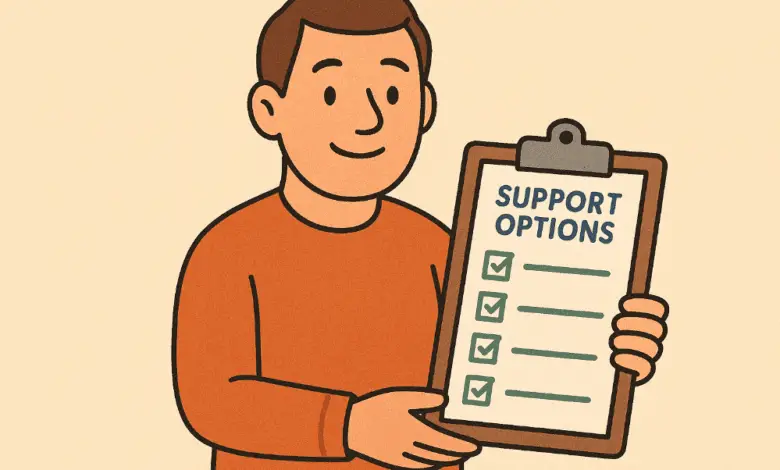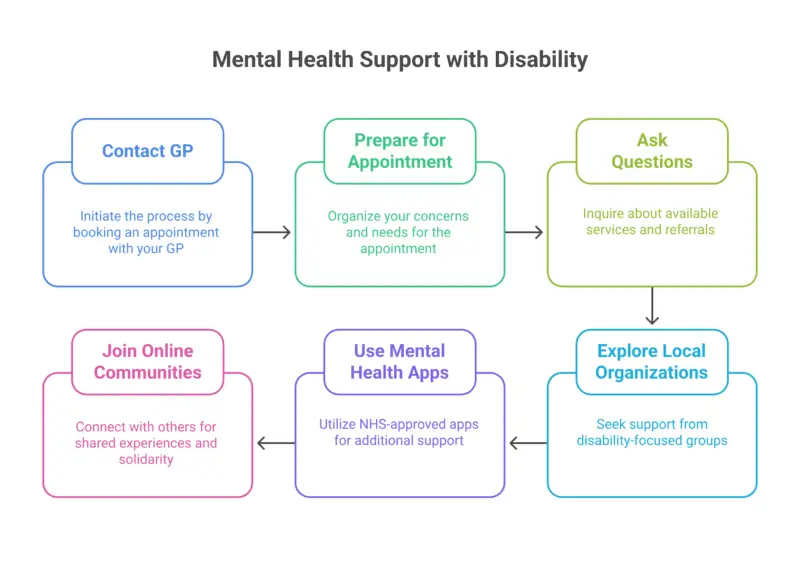
Accessing the Right Psychiatric Care: Advice for Disabled People
When You Might Need Psychiatric Care
There are times when adding psychiatric care to your mental health support makes sense, especially if you’re dealing with complex needs connected to disability. That’s where a psychiatrist can help, bringing medical expertise to assess symptoms, suggest treatment options, and consider how your disability factors in.
Key Takeaways
| Topic | Summary |
|---|---|
| When psychiatric care may help | Medication and psychiatric input can be useful alongside therapy, especially for disabled people with complex needs. |
| Accessing a psychiatrist | Referrals can be made through your GP or consultant; private options also exist with varying costs. |
| Intensive mental health support | Crisis teams, CMHTs, and respite services are available when weekly therapy isn’t enough. |
| Recognising red flags | Changes in disability management, increased physical symptoms, or social withdrawal may signal mental health decline. |
| Supporting others | Friends, carers, and family can help by offering practical support and encouraging timely help-seeking. |
| Coordinating care | Clear communication between mental health and disability providers ensures more joined-up support. |
| Getting started | A GP appointment is often the first step. Ask about local, accessible mental health services and prepare for the process. |
Adding a Psychiatrist to Your Support Team
A psychiatrist is a medical doctor who specialises in mental health. They can:
- Review how your mental health symptoms interact with your disability
- Check for medication interactions with treatments you’re already taking
- Prescribe antidepressants, mood stabilisers, or anti-anxiety medication if helpful
- Adjust doses based on how your body processes medication
You can access NHS psychiatric care through your GP, or ask your existing consultant if they can refer you. Private psychiatric appointments typically cost £300-500, but some psychiatrists offer reduced rates.
Intensive Support When You Need It Most
If you’re in crisis or need more support than weekly therapy can provide, there are other options available:
Crisis Teams
Most areas have Crisis Resolution and Home Treatment Teams available 24/7. They can visit you at home and provide intensive support to help you avoid hospital admission. Ask your GP or call 111 to access them.
Community Mental Health Teams (CMHTs)
These teams include psychiatrists, mental health nurses, social workers, and occupational therapists. They’re designed for people with ongoing, complex mental health needs and can coordinate with your existing disability services.
Crisis Houses and Respite Care
Some areas offer short-term residential support as an alternative to hospital. These can be particularly helpful if your home environment isn’t accessible during a mental health crisis.
Don’t wait until you’re at breaking point. These services exist to help before things become unbearable.
Recognising When Mental Health Affects Your Disability
Mental health symptoms can show up differently when you’re already managing a disability. Here are some disability-specific warning signs:
- Your usual coping strategies stop working—routines that normally help you manage your condition feel impossible
- Physical symptoms get worse without any medical reason (pain, fatigue, seizures, or digestive issues)
- You’re struggling with basic disability management—forgetting medication, skipping physio, or avoiding medical appointments
- You’re withdrawing from your community—avoiding support groups, online forums, or friends
- Care needs increase suddenly—needing more help with things you could usually manage
- You’re avoiding accessibility tools you normally use (wheelchair, hearing aids, communication devices)
If any of these sound familiar, it’s worth speaking to someone who understands both mental health and disability.
Supporting a Disabled Person Through Mental Health Struggles
Whether you’re a family member, friend, or carer, supporting someone with both disability and mental health challenges requires a thoughtful approach.
What You Can Do
“I’ve noticed you seem to be struggling more than usual with [specific examples]. I care about you, and I’m wondering if some extra support might help right now. Would you like me to help you look into some options, or come with you to an appointment?”
Practical Support
- Offer to research accessible services—many disabled people are too exhausted to do the research and admin involved.
- Help with getting to appointments – transport, childcare, or simply being there for moral support
- Advocate for reasonable adjustments—call ahead to ensure venues are accessible, or request home visits
- Connect them with disability-aware services—some therapists specialise in working with disabled clients
When to Involve Others
If someone’s mental health is affecting their safety or their ability to manage their disability, you might need to involve:
- Their GP or disability consultant
- Social services (if they receive care packages)
- Local advocacy organisations they may be part of
- Crisis services if you’re genuinely worried about their immediate safety
Remember: you can’t fix everything, but your presence and advocacy can make a real difference.
Coordinating Mental Health Care with Your Existing Support
If you already receive disability-related care, adding mental health support doesn’t have to complicate things. Here’s how to make it work together:
Tell Your Mental Health Provider About Your Disability
Be upfront about your condition, medications, and how it affects your daily life. This helps them:
- Understand how mental health symptoms might interact with your disability
- Suggest therapy approaches that work with your needs
- Coordinate with your existing medical team when necessary
Keep Your Disability Team in the Loop
Let your GP, consultant, or key worker know you’re accessing mental health support. They can:
- Share relevant information (with your consent)
- Adjust your disability management plan if needed
- Spot patterns between your mental and physical health
Pro tip: Keep a simple diary noting your mood, energy, and physical symptoms. This can help both teams understand what’s working. Building mental strength through daily habits works alongside professional support.
Your Step-by-Step Guide to Getting Started
Taking the first step can feel overwhelming, especially when you’re already managing a disability. Here’s a practical roadmap:

Contact GP – “Initiate the process by booking an appointment with your GP”
Prepare for Appointment – “Organise your concerns and needs for the appointment”
Ask Questions – “Inquire about available services and referrals”
Explore Local Organisations – “Seek support from disability-focused groups”
Use Mental Health Apps – “Utilise NHS-approved apps for additional support”
Join Online Communities – “Connect with others for shared experiences and solidarity”
Arrows connect the steps in sequence, illustrating a cycle of support options for disabled people seeking mental health care.
Step 1: Contact Your GP
Call or book online. When you speak to the receptionist, say:
“I’d like to book an appointment to discuss mental health support. I have [disability] and I’m finding it harder to cope lately. I’d like to explore what options might be available.”
Step 2: Prepare for Your Appointment
- Write down your main concerns and how long you’ve been struggling
- List your current medications and treatments
- Note any reasonable adjustments you might need (longer appointments, accessible venues, etc.)
Step 3: Ask the Right Questions
- “What mental health services are available locally that understand disability?”
- “Can you refer me to NHS Talking Therapies or do I need to self-refer?”
- “Are there any services that can visit me at home if needed?”
- “How long are the waiting lists, and is there any support available while I wait?”
Step 4: While You Wait
NHS waiting lists can take time. While you’re waiting for therapy or a referral, there are other ways to get support:
- Reach out to local disability organisations – many offer peer-led groups, short-term counselling, or check-in calls. They may also know what’s available in your area right now.
- Explore NHS-approved mental health apps:
- SilverCloud is available in many NHS areas through self-referral to a local Talking Therapies service. In some places, like Wales, you can sign up directly online if you’re over 16 and registered with a local GP.
- Beating the Blues usually requires a referral from your GP, a mental health worker, or—if you’re on the Restart Scheme—an employment advisor. Direct sign-up may be possible if you’re given a special access code.
General NHS Talking Therapies Self-Referral: You can find your local service and self-refer via the NHS website by searching “NHS Talking Therapies self-referral” or visiting the NHS Talking Therapies page, which provides a postcode search for your nearest service.
- Join online communities – spaces like Scope’s online community or forums linked to your condition can be a helpful way to connect, share experiences, and find solidarity.
Before Your First Mental Health Appointment
Call ahead to request:
- Accessible parking or transport links
- Ground floor appointments or lift access
- Longer appointment slots if you need extra time
- BSL interpreters or communication support
- Permission to bring a support person
Most services are happy to make adjustments—you just need to ask.
Remember: Getting help is a sign of strength, not weakness. You’re already managing more than most people can imagine. Adding mental health support to your toolkit makes complete sense.
Why Accessible Mental Health Support Matters: Richard’s Experience
Richard is deaf and had spent years trying to manage his mental health without much success. Outpatient services often fell short, mostly because communication wasn’t accessible. Therapists didn’t use sign language, and Richard regularly left appointments feeling frustrated or overlooked.
Things reached crisis point in 2015, when his mental health deteriorated to the point of a suicide attempt. He was admitted to the hospital with serious injuries.
That’s when everything changed. Richard was moved to a specialist psychiatric ward for deaf people, where every member of staff could sign. For the first time in decades, he felt calm. He felt seen. He started Cognitive Analytic Therapy with a psychologist fluent in sign language, which gave him tools to make sense of his experiences.
After four months of tailored support, Richard was discharged with a plan: regular check-ins from his local Community Mental Health Team and ongoing care from a specialist service for deaf adults.
His story shows what’s possible when psychiatric care is designed around access. For Richard, progress started when the care finally made sense for his needs, his communication, and his life.
If you’re struggling and feel like you haven’t been heard, it’s worth asking for support that actually fits your needs. That one change—being understood—can make all the difference.
📌 Quick Help Resources
- 📞 Samaritans: 116 123 (free, 24/7) (UK number)
- 📲 Text SHOUT to 85258 in UK or HELLO to 741741 (24/7, free) in USA
- 🧠 NHS Mental Health Help
- 🧭 Mind’s Local Services Directory
- 📚 Mental Health – WHO definition and resources
- 💪 Help your mind stay strong – building mental resilience
- 🏥 How to support someone – Rethink
About the Author
Duncan Edwards is a writer and accessibility advocate. He specialises in inclusive design, disability rights, and practical support solutions that reflect real-life needs. As a full time carer, Duncan writes from both lived experience and professional insight, always with a focus on clarity, respect, and action that matters.